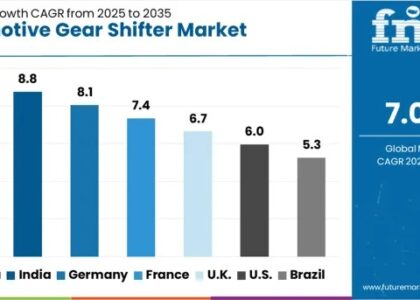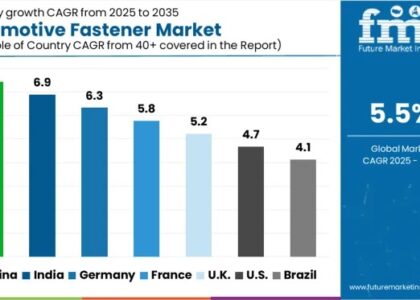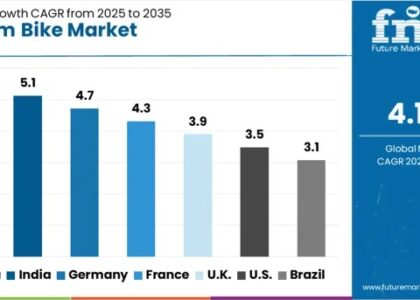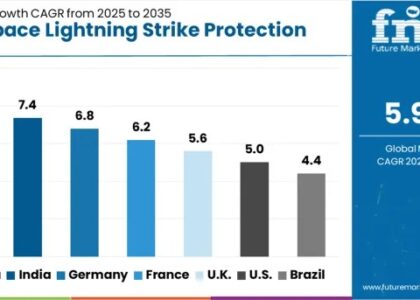Anticipating a value of US$ 15.1 billion in 2023, the global mineral wool market is poised for significant expansion, driven by the growing energy and power sector, with a projected Compound Annual Growth Rate (CAGR) of 4.3% from 2023 to 2033, culminating in a total worth of approximately US$ 23.0 billion by the year 2033.
Germany and the United States are experiencing a significant surge in the demand for mineral wool, driven by several key factors. In Germany, the emphasis on sustainable construction practices, including the use of eco-friendly and recyclable materials, is propelling the growth of the mineral wool market. This insulation material, derived from natural or recycled sources, aligns perfectly with the country’s eco-conscious construction trends. Germany is poised to maintain a strong Compound Annual Growth Rate (CAGR) of 4.1% during the forecast period, thanks to its commitment to sustainable building.
In the United States, the increasing adoption of sustainable building practices and green construction is a driving force behind the demand for mineral wool. As a recyclable and eco-friendly insulation material, mineral wool meets the sustainability criteria of this market. Moreover, its exceptional fire resistance properties make it a preferred choice, as the country has stringent building codes prioritizing fire safety and energy efficiency. The U.S. is projected to maintain a robust CAGR of 4.0%, with mineral wool finding extensive use in industrial applications within a thriving industrial sector. This versatile material provides thermal insulation and enhances safety in facilities such as power plants, refineries, and manufacturing plants.
Request Free Sample Report: http://www.futuremarketinsights.com/reports/sample/rep-gb-4317
The Key Players:
The prominent players for the global mineral wool market includes
- Saint-Gobain S.A.,
- ROXUL ROCKWOOL Technical Insulation,
- Knauf Insulation,
- Industrial Insulation Group LLC.
Mineral wool is made from the resource which is abundant in nature and is energy efficient. Mineral wool market is majorly driven by the industrial applications where the mineral wool is used as an insulation and filler. It is also used as acoustical solution as a noise barrier in the areas where noise levels are high than the desired noise level prescribed as per government regulations.
Primarily Driving the Market for Mineral Wool
- Sustainable Construction Practices: The growing emphasis on sustainable and eco-friendly construction practices is a major driver. Mineral wool is considered an environmentally friendly insulation material, making it a preferred choice in regions where sustainability is a priority, such as Germany and the United States.
- Renovation and Retrofitting Activities: In Germany, considerable growth is expected due to ongoing renovation and retrofitting projects. Mineral wool is often chosen for its insulation properties in these activities, further boosting the market.
- Industrial Sector Demand: In the United States, the robust industrial sector is a significant driver. Mineral wool is extensively used in industrial applications to provide thermal insulation, reduce energy loss, and enhance safety in facilities like power plants and refineries.
- Stringent Building Codes: Both Germany and the United States have well-established building codes and standards. Mineral wool, known for its fire resistance properties, aligns with these regulations, driving demand for its use as a fire protection material in buildings.
- Continuous Technological Advancements: The mineral wool industry, in both countries, is characterized by continuous technological advancements and product innovations. Manufacturers invest in research and development to enhance the performance, durability, and installation properties of mineral wool, catering to evolving market needs.
Emerging Trends in the Mineral Wool Market-
- Technological Advancements: Improving Performance and Efficiency Manufacturers are investing in advanced technologies to enhance the performance and efficiency of mineral wool insulation. Innovations such as hydrophobic mineral wool and vacuum insulation panels are gaining traction in the market.
- Focus on Sustainable Manufacturing and Recycling With increasing emphasis on sustainability, manufacturers are adopting eco-friendly production processes and exploring recycling initiatives for mineral wool waste. These initiatives aim to minimize the environmental impact and promote a circular economy.
- Adoption of Advanced Insulation Techniques Building professionals are increasingly incorporating advanced insulation techniques, such as double-stud walls and continuous insulation systems, to maximize energy efficiency. Mineral wool insulation plays a vital role in these systems due to its excellent thermal properties.
- Integration of Smart Technology for Energy Management The integration of smart technology and IoT (Internet of Things) solutions in buildings is driving the demand for intelligent insulation materials. Mineral wool products with smart features, such as sensors for monitoring temperature and energy consumption, are gaining popularity.
Key Segments-
By Type:
- Glass
- Rock
- Slag
By Application:
- Construction
- Transportation
- Industrial
- Residential
- Sound Absorbers
- Emission Control
- Acoustical
- Fire-Proofing
The Western Europe is the leading region for the demand of mineral wool market due to rising demand for the insulation from the Germany owing to rapid investment in the building renovation program. Europe in order to strengthen its economic stability post 2012 crises led to increased mineral wool consumption for various industrial and commercial applications. North America, being second in the mineral wool market position after Europe, contributes significant share in the growth of mineral wool market. Owing to tightened regulations about the insulation thickness and increase in demand from the automotive industry, the North America market is expected to propel the demand for the global mineral wool market.
Request Customization: https://www.futuremarketinsights.com/customization-available/rep-gb-4317
Challenges and Restraints-
- Raw Material Availability and Price Volatility The production of mineral wool heavily relies on raw materials such as basalt and slag. Fluctuations in the availability and prices of these raw materials can impact the overall production cost and, subsequently, the market growth.
- Intense Competition from Alternative Insulation Materials While mineral wool offers several advantages, it faces competition from alternative insulation materials such as fiberglass, polyurethane foam, and cellulose. Manufacturers need to differentiate their products and demonstrate the unique benefits of mineral wool to maintain their market share.
- Health and Safety Concerns The handling of mineral wool fibers during installation or manufacturing can potentially pose health risks if proper precautions are not taken. It is crucial for manufacturers to adhere to safety guidelines and educate users about the safe handling and disposal of mineral wool.
About Future Market Insights (FMI)
Future Market Insights, Inc. (ESOMAR certified, recipient of the Stevie Award, and a member of the Greater New York Chamber of Commerce) offers profound insights into the driving factors that are boosting demand in the market. FMI stands as the leading global provider of market intelligence, advisory services, consulting, and events for the Packaging, Food and Beverage, Consumer, Technology, Healthcare, Industrial, and Chemicals markets. With a vast team of over 5000 analysts worldwide, FMI provides global, regional, and local expertise on diverse domains and industry trends across more than 110 countries.
Contact Us:
Future Market Insights Inc.
Christiana Corporate, 200 Continental Drive,
Suite 401, Newark, Delaware – 19713, USA
T: +1-845-579-5705
For Sales Enquiries: sales@futuremarketinsights.com
Website: https://www.futuremarketinsights.com
LinkedIn| Twitter| Blogs | YouTube






